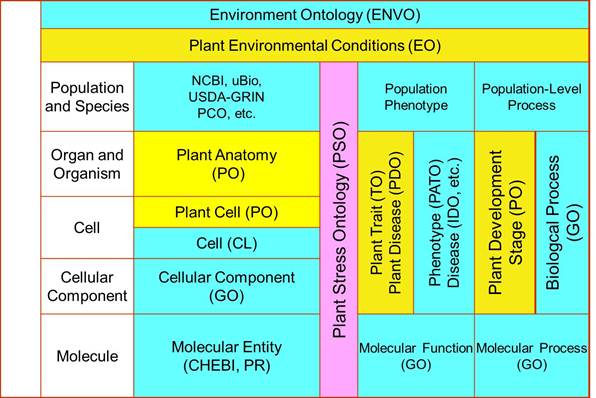Difference between revisions of "PRO-PO-GO Meeting"
m (→Draft Schedule) |
m (→Draft Schedule) |
||
| Line 95: | Line 95: | ||
13:30 Documenting Success Stories in Application of Annotated Genome Data | 13:30 Documenting Success Stories in Application of Annotated Genome Data | ||
| − | : | + | :Participants are invited to bring success stories regarding use of ontology-based annotations in areas such as |
::Diversity research (Inter-Species) | ::Diversity research (Inter-Species) | ||
::Discovering similarities and dissimilarities within organisms (Intra-Species) | ::Discovering similarities and dissimilarities within organisms (Intra-Species) | ||
::Identification of species for forensic purposes | ::Identification of species for forensic purposes | ||
| − | :: | + | ::Identification of the structures involved in given biological processes (for example pollination) |
| − | :: | + | ::Identification of the processes involved in phenomena such as disease |
16:00 Close | 16:00 Close | ||
Revision as of 19:24, 10 April 2013
PRO-PO-GO: Challenges of Ontology Coordination Across Organisms
A meeting designed to promote the coordination of the Gene, Protein, and Plant Ontologies and of other reference ontologies used in plant biology
Venue: Ramada Inn, Amherst, NY 14221
Date: May 15-16, 2013. The meeting will start at 10am on May 15 and conclude at 4pm on May 16.
Goals
The goals of this meeting are:
- 1. To inform members of the Protein, Plant, Gene Ontology and related communities of developments in their respective ontologies in order to promote cross-ontology coordination. Specifically:
- a. To enhance the treatment of plant-related proteins in the Protein Ontology
- b. To address issues concerning reuse of GO terms to describe plant-related entities, for example in the treatment of plant life cycle and development stages
- 2. To address general issues which arise when ontologies need to be extended to cover multiple species of organisms
- 3. To contribute to the cROP (Common Reference Ontologies for Plants) initiative
- 4. To contribute to the ontological understanding of phenotype and disease across organisms.
- 5. To identify potentially fruitful applications which enhanced ontology coordination might bring.
cROP: Common Reference Ontologies for Plants
Yellow = cROP ontologies for plants; Blue = general reference ontologies; Pink = to be developed by cROP

Draft Schedule
Tuesday, May 14, 6pm: Dinner (details will follow)
Wednesday, May 15, 2013
8:15 Registration and continental breakfast
9:00 From the OBO Foundry to cROP
- Outline of the cROP Framework (Pankaj Jaiswal)
- Overview of general ontologies used within the cROP Framework
- Presentations will focus on:
- Current or planned treatment of multiple organism types
- Important applications of these ontologies
- Experiences in the use of these ontologies in coordination (prototypically via use of terms from coordinating ontologies in cross-product definitions)
- Molecules:
- Protein Ontology (PRO) (Cathy Wu)
- CHEBI and Natural Products of Plant Origin(Janna Hastings)
- Cells
- GO-Cellular Component (Alex Diehl)
- Cell Type Ontology (CL) (Alex Diehl)
- Use of PRO in defining Cell Types
- Plant Cell branch of the Plant Ontology (PO)
10:30 Break
10:45 The Coordinating Role of the Gene Ontology (Jane Lomax)
- Questions to be addressed include:
- How does the GO view the division of labor with regard to describing Biological Processes (BPs) which are not within the scope of the GO BP ontology especially in regard to stage ontologies such as the cell life cycle ontology or the PO plant development stage ontology?
- How are growth and development terms to be dealt with across organisms?
- What are the lessons learned from the GO's experience in coordinating with other ontologies using GO terms in definitions?
12:00 Lunch
13:00 Traits and Phenotypes
- Phenotypic Quality Ontology (PATO) (Chris Mungall)
- The treatment of population phenotypes and use of the Population and Community Ontology (PCO) (Ramona Walls)
- Plant Trait Ontology (TO) (Pankaj Jaiswal)
- Critical remarks on PATO and TO (Barry Smith)
14:30 Break
15:00 Defining Disease Across Organisms (Judith Blake)
- Defining Disease
- The Plant Disease Ontology and the Plant Infectious Disease Ontology (Ramona Walls)
17:00 Close
18:00 Working Dinner in the Ramada Inn Restaurant
Thursday, May 16th, 2013
8:15 Continental breakfast
9:00 The Coordinating Role of the Protein Ontology
- PRO and UniProt (Cathy Wu and Claire O'Donovan)
- Maintaining Ontologies Across Multiple Species: The Case of the PRO (Darren Natale)
10:30 Break
11:00 Interface Points between cROP plant ontologies and the Protein Ontology
12:30 Lunch
13:30 Documenting Success Stories in Application of Annotated Genome Data
- Participants are invited to bring success stories regarding use of ontology-based annotations in areas such as
- Diversity research (Inter-Species)
- Discovering similarities and dissimilarities within organisms (Intra-Species)
- Identification of species for forensic purposes
- Identification of the structures involved in given biological processes (for example pollination)
- Identification of the processes involved in phenomena such as disease
16:00 Close
Participants
PO Consortium
- Laurel Cooper (Oregon)
- Pankaj Jaiswal (Oregon)
- Barry Smith (Buffalo)
- Dennis Wm. Stevenson (New York Botanical Gardens)
GO Consortium
- Judith Blake (JAX)
- Jane Lomax (EBI)
- Chris Mungall (Berkeley)
PRO Consortium
- Cathy Wu (Delaware)
- Darren Natale (Georgetown)
- Alan Ruttenberg (Buffalo)
Cell Ontology
- Alex Diehl (Buffalo)
BFO
- Stefan Schulz (Graz)
- Selja Seppälä (Buffalo)
UniProt
- Claire O'Donovan (EBI)
CHEBI
- Janna Hastings (EBI, Geneva)
Arabidopsis Information Portal
- Christopher D. Town (J. Craig Venter Institute)
The iPlant Collaborative
- Ramona Walls
TAIR
- Tanya Berardini (Stanford)
- Eva Huala (Stanford)
Other participants:
- Alexander Cox (Buffalo)
- Mark Jensen (Buffalo)
A limited number of places are available for additional participants. Please contact Barry Smith for further information.
Note that this meeting is co-located with the BFO 2.0 meeting, which will take place in Buffalo on May 13-14.